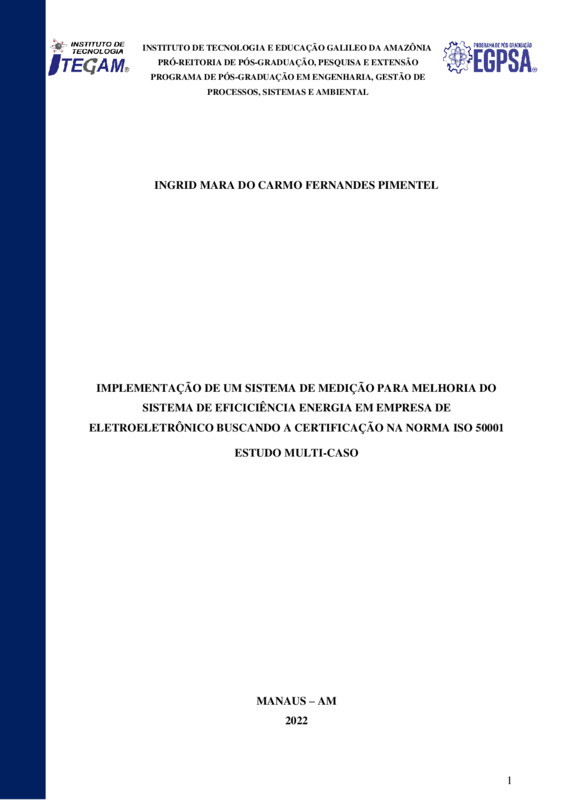-
Tipo do ITEM
-
pt-BR
Dissertação de Mestrado
-
Título da Dissertação ou Tese
-
pt-BR
IMPLEMENTAÇÃO DE UM SISTEMA DE MEDIÇÃO PARA MELHORIA DO SISTEMA DE EFICICIÊNCIA ENERGIA EM EMPRESA DE ELETROELETRÔNICO BUSCANDO A CERTIFICAÇÃO NA NORMA ISO 50001 ESTUDO MULTI-CASO
-
Descrição
-
pt-BR
Fatores que influenciam e determinam o grau de competitividade de uma organização, principalmente aqueles que prezam por boas práticas ambientais, sociais e de governança corporativa são fundamentais para o seu sucesso, pois juntos contribuem na construção de instrumentos de gestão e na implementação de ações de melhoria da competitividade. Existem outras temáticas para que a competitividade seja obtida em todos os campos, porém, o foco na questão ESG (acrônimo inglês para Environmental, Social and Governance) é mais um indicativo de quanto a temática “sustentabilidade” ter ganho cada vez mais relevância no mercado e consequentemente nos negócios. Dentro do contexto abordado acima, este trabalho, trata especificamente da implementação de um sistema de medição para melhoria do sistema de eficiência enérgica em empresa de eletroeletrônico buscando a certificação na norma ISO 50001, onde é descrito um processo que tem como objetivo registrar e analisar cientificamente os eventos ocorridos durante os processos de monitoramento de consumo de energia por equipamentos de uso significativos de energia (USE) como parte do processo de obtenção de certificação da norma e aprimoramento de máquinas, equipamentos e processos relativos reduzindo o consumo de energia preservando o meio ambiente. A metodologia foi seguida a partir do diagnóstico energético da organização usando o método PDCA, e aplicado uma planilha para colher os dados diariamente, sendo apriomorado para um sistema que medição automática desenvolvida para essa tratativa. Como resultado final, o objetivo é a obtenção de boas práticas para redução de energia e obtenção da certificação na norma com essa finalidade. Esse estudo de caso retrata o processo de certificação de uma empresa eletroeletrônica na norma de Sistema de Gestão Eficiência Energética é de fundamental importância por trazer resultados para a organização em termos de redução do consumo de energia e redução de impacto para o meio ambiente e melhorias decorrentes contribuindo signifativa para a ciência com o desenvolvimento de software de medição.
-
Abstract
-
en
We know that a series of factors influence and determine the degree of competitiveness of an organization, especially those that value good environmental, social and corporate governance practices. Of course, there are other themes for competitiveness to be obtained in all fields, however, the focus on the ESG issue (English acronym for Environmental, Social and Governance) is another indication of how much the theme “sustainability” has gained more and more relevance in the market and consequently in business. In fact, the environmental issue was cited as one of the main points of concern for today's society in the most recent edition of The Global Risks Report, by the World Economic Forum (WEF), which highlighted issues such as extreme weather events, failures in negotiations regarding climate, environmental damage and loss of biodiversity as major threats. In addition to the environmental aspect, society has also shown itself to be increasingly concerned with social and governance values. Socially, it has become essential to ensure a diverse corporate environment. More transparency and honesty in business began to be valued. Thus, the three pillars of competitiveness are basically centered on: Within the context discussed above, this work deals specifically with the ISO 50001 Standard - Energy Management System, where a process is described that aims to scientifically record and analyze the events that occur during the processes of monitoring energy consumption by electrical equipment. significant energy use (USE) as part of the standard certification process. During the process, all the tools applied to develop the work were used, such as; Strategic Planning, PDCA, Swot Matrix, o and Hoshin Plan. The need is detailed in the organizational strategic planning and continues to be deployed in the organization. As a final result, the objective is to obtain certification in the standard with the understanding and fulfillment of all the items in question, within the planned period. This case study that portrays the certification process of an electronics company in the Energy Efficiency Management System standard is of fundamental importance for bringing results to the organization in terms of reducing energy consumption and reducing impact on the environment and improvements arising. The methodology used in the company was based on the energy diagnosis of the organization and using the PDCA method. The objective of the article is also to demonstrate, at the end, the level of knowledge of employees for the development that involves Energy Management after the organization's certification, done through field research.
-
Língua do arquivo
-
pt-BR
Português
-
Data da Defesa
-
pt-BR
13/12/2022
-
Palavra-chave
-
pt-BR
Eficiência Energética
-
pt-BR
Gestão da Eficiência Energética
-
pt-BR
Planejamento Estratégico
-
Autor
-
pt-BR
INGRID MARA DO CARMO FERNANDES PIMENTEL
-
Orientador
-
pt-BR
Jandecy Cabral Leite
-
Local
-
pt-BR
Manaus / Brasil
-
Áreas de Conhecimento
-
pt-BR
Otimização de Processos Industriais
-
Turma
-
pt-BR
Turma 01


